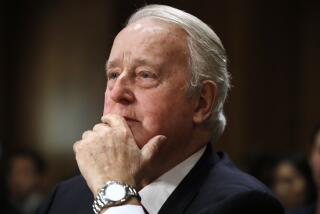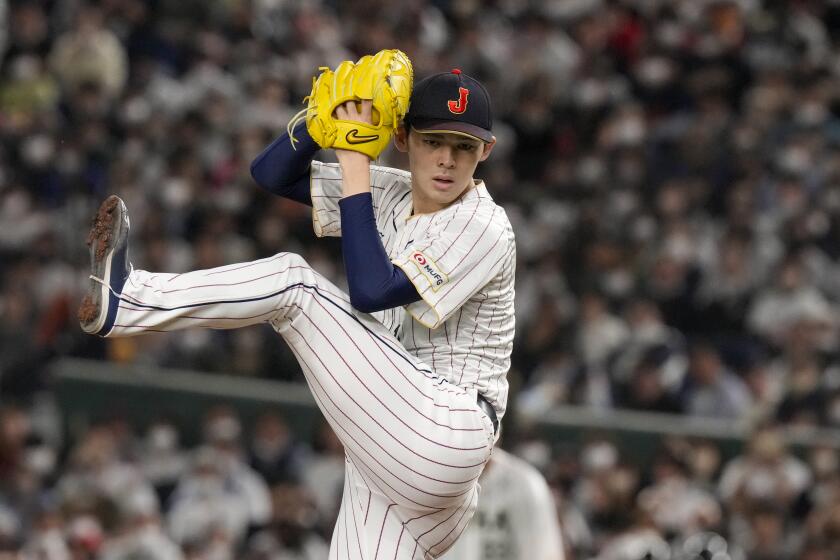Canadians Jeer ‘Tunagate,’ but Mulroney Is Not in Major Trouble
- Share via
OTTAWA — When Prime Minister Brian Mulroney showed up for the opening game of the American League championship playoffs in Toronto, the fans booed good naturedly, then began to chant: “Tuna! Tuna! Tuna!”
The crowd, with its rowdy reference to a long-running flap over the government-approved public sale of a million cans of rancid tuna, was telling Mulroney that he could not escape what has come to be the most trying time of his year in power, not even at the baseball stadium.
It cannot be fairly said that the Mulroney government is in crisis, even in difficulty, but the prime minister has a number of problems that he and most political analysts did not foresee when, just over a year ago, he led the Progressive Conservative Party to the biggest electoral victory in Canadian history.
Bank Failures
In addition to the tuna controversy--”Tunagate,” the local newspapers call it, in an overstatement--Mulroney has been hard-pressed since Parliament began its current session last month to deal with other issues. These include the billion-dollar failure of two Western Canadian banks, a police investigation into the campaign spending of a key Cabinet minister and charges by political opponents that yet another Cabinet minister spent government time and money on a vacation in Europe.
As a result of these controversies, two Cabinet ministers have resigned and the prime minister himself has been accused by the two opposition parties of incompetence and covering up incriminating details.
Worse, in the mind of his aides, Mulroney has been forced onto the defensive at a time when he wanted to project the positive image of a confident national leader and international statesman and to consolidate public support for important legislative policies.
The troubles also point up the difficulties that Mulroney has had in organizing and controlling his party in Parliament, where it has 211 of the 282 seats but is frequently caught up in conflicting internal demands and interests.
As a diplomat observed, after asking not to be identified by name, “Brian doesn’t always seem to be as effective a government leader as he is a campaign politician.”
‘Contrived’ Atmosphere
Mulroney denies anything and everything. He said in an interview that he has acted “openly and with integrity” and that most of the criticism has been motivated by political opponents taking advantage of the “contrived” atmosphere of Parliament, where “theatrics” are more important than substance.
And, in fact, despite critical headlines and editorials, there is no sign that Mulroney is in serious trouble with the voters.
The latest public opinion polls show that Mulroney has slipped about 5 percentage points. But the major opposition Liberal Party has advanced only 1 percentage point from its historic low position of less than 30% public approval.
Mulroney attributes this apparent contradiction between the political tension of Ottawa and the complacency of the public to several factors. Peering through his granny-style reading glasses at a sheaf of statistics, he reels off figures about economic performance:
“Unemployment is down, we’ve created thousands of new jobs, inflation is at a 10-year low. That’s what the people pay attention to.”
They pay no attention, he insisted, to the “crap” put forth in Parliament by that “bird,” a reference to the vitriolic attacks by John Turner, the Liberal Party leader.
‘Fairness’ Endangered
Although Mulroney is as sharp-tongued and sarcastic as any of his opponents in the barely organized mayhem of Parliament’s daily question period, he said in the interview that the Liberals and the New Democratic Party, the No. 2 opposition party, are going too far and are endangering the “doctrine of fairness” that most Canadians accept.
“The people will not forgive--in this country--unfairness or intolerance,” he said.
Mulroney will not have to deal with an election for another four years and, under the strict party discipline of the Canadian system, there is no danger that any legislative program he proposes will be defeated, no matter what the opposition says or does.
Still, and despite the confidence he displays in public, Mulroney shows some signs of stress. Even the interview, with two American reporters, could be taken as an effort to offset any impression in the United States that he is in political trouble.
The interview was the first that Mulroney has given to any Canadian-based American reporter since he took office, and it came as he announced the opening of important talks on a free trade agreement with the United States.
“It is obvious that he doesn’t want talk of his government under crisis drifting across the border with the free trade talks about to begin,” an official in the prime minister’s office said.
Strain Acknowledged
In the interview, Mulroney acknowledged both the strain and his inability to control events, saying that while he expects his troubles to evaporate with time, “if you’re asking me whether I’d like to do it again, the answer is no.”
He recalled that John Boccabella, an undistinguished catcher with the Montreal Expos expansion team of 1969, was asked how he felt after going hitless in a game and that Boccabella had answered, “I felt great, but I don’t think I did too well.”
“Well,” the prime minister said, “that goes for me.”
Mulroney spoke wistfully of escaping the grilling of the question period, with its unbridled and often vicious attacks.
“I’ll confess to you that there are moments when I pray for a Rose Garden,” he said, referring to the relatively greater degree of control that U.S. Presidents have over the flow of information from their administrations.
But question period “is part of our system,” he said, adding: “It’s unusual, probably untidy and occasionally unpleasant, but it’s an important part of our system.”
Yet, in the days just after the interview, Mulroney all but stopped attending the hourly question time and then left Ottawa for two weeks to attend international meetings in the Bahamas and at the United Nations.









